Wastewater Operators Achieve Nitrification Compliance
Nitrification is the most critical process at water resource recovery facilities (WRRF). Good process control keeps several factors in balance such that nitrification is achieved resulting in efficient removal of ammonia from treated effluent. On the other hand, without timely process monitoring, it is hard to know the effectiveness of your process control decisions.
The threat of an upset event which can lead to multiple non-compliance events is enough to keep Operators awake at night. This was the case at the Meander Watershed Water Pollution Control Facility. The facility’s small footprint and short retention time present unique barriers to achieving compliance with discharge limits for ammonia-nitrogen. It wasn’t until they had an opportunity to use an online monitoring system from YSI that operators finally got a handle on nitrification problems.
Compliance Challenges
The Meander WRRF National Pollution Discharge Elimination System (NPDES) permit requires treated effluent to not exceed an average monthly limit of 1.9 mg ammonia-N/L in summer and 5.0 mg ammonia-N/L in winter. The stringent limits require the facility to maintain nearly complete nitrification year-round.
This is particularly challenging at Meander Creek due to the High Purity Oxygen (HPO) activated sludge configuration. (Learn more, How to Control Activated Sludge with Online Sensors). A major advantage of the process is that it uses smaller tanks, resulting in a shorter overall retention time and reduced tankage compared with conventional configurations allowing operators to make corrections quickly. However, it also means problems can get of hand rapidly. Making matters worse, the process requires covered aeration tanks which trap carbon dioxide, reducing the alkalinity and blocking nitrification. Meander operators add 50% caustic soda to the influent to raise alkalinity sufficiently to allow for nitrification.
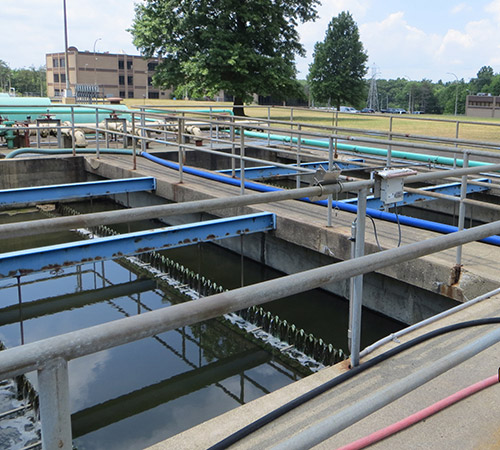
Meander Water Pollution Control Facility
However, it wasn’t just a short retention time that made it difficult to stay on top of problems with high ammonia levels. The lack of real-time data also presented a significant roadblock to compliance.
Before using the IQ SensorNet monitoring and control system, process control decisions were based on grab sample measurements. The results were fast using a gas-sensitive ammonia electrode probe but they didn’t have the resources to measure more than once or twice per week. As a result, problems were often out of control before operators were even aware of an issue.
This delayed response kept the team largely in reaction mode, making it impossible to proactively address NPDES compliance requirements and ensure the best effluent possible.
The Meander WRRF team knew this process was inefficient and created significant environmental and compliance risks. But like many facilities, limited financial resources constrained their ability to make large-scale capital improvements. Ultimately, the solution was much simpler, and it was one that actually put money back into their operating budget.
In Ohio, when utilities need technical assistance, they can turn to the Ohio EPA Compliance Assistance Unit (CAU). The CAU utilizes many monitoring tools to help them troubleshoot underperforming systems and create cost-effective solutions. One of the most effective tools for troubleshooting nitrification and denitrification is YSI’s IQ SensorNet (IQSN) process monitoring system.
The CAU set up two of their IQSN systems, one in the first stage and the other in the second stage, to continuously monitor ammonium and nitrate in an attempt to identify factors limiting performance. The tools made a big impression on treatment plant supervisor, Ben Watson and field supervisor, Joe DeNiro.
Nitrification Limitations
Nitrification limitations can be caused by many factors, including oxygen limitation, inhibition due to toxicity, insufficient solids retention time (SRT), and inhibition due to alkalinity limitation. (Download, Implementation of Solids Retention Time in Wastewater]. Each factor has specific hallmarks which online process monitoring can easily detect. In the case of HPO, alkalinity is sometimes a limitation because of the unique characteristics of the process. Nitrification in conventional processes consumes over 7 lbs. of alkalinity per lb. of ammonia nitrified. However, in the case of HPO, the alkalinity requirement is much higher due to the accumulation of carbon dioxide in the headspace. The data from the CAU monitoring system confirmed the alkalinity limitation. (Learn more, How to Control Denitrification with Online Sensors).
“They made some tweaks on our sampling and caustic soda feed point,” says Watson. “They were able to carefully manipulate ammonia with caustic soda, and the YSI instruments would tell them exactly to the minute what had happened.”
The CAU’s monitoring system remained at the facility for 6 months during which time DeNiro and Watson had an opportunity to evaluate the system more closely.
“We used these meters for a couple of months and they really wowed us, so we bought a set for ourselves,” says Watson.
“My staff would make fun of me because I would stand in front of the terminal just to watch the ammonium change. Seriously, the information has proved invaluable." “It’s worked out very well for us,” he adds.
Setup for the IQ SensorNet system went very smoothly and was completed in-house with help from local YSI dealer Bergren and Associates and the CAU. The system’s unique single-cable design incorporates power and communication in one cable, simplifying setup and reducing installation costs.
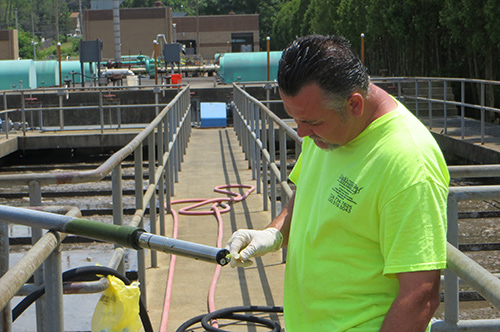
Vince Cappitte cleaning a VARiON ISE probe
The plant started with the CAU evaluation configuration and took it one step further. A VARiON® 700 probe with ammonium, nitrate, and potassium electrodes are wired into a junction box (MIQ/JB) at the first stage and second stage clarifiers. In addition, a SensoLyt with pH electrode is also installed in the second stage clarifier. The VARiON measurements are continuously communicated to an IQ SensorNet 2020 universal controller located in the control building via a wireless module. This provided the convenience of having a place to dock the 2020 in the control building without the cost of having to install conduit in a new trench. The 2020 is programmed to log measurements every 10 minutes so Watson and DeNiro can closely monitor conditions entering the second stage.
“If I see in the first step that ammonium is getting higher, I can watch it closely and make adjustments,” says Watson. In one instance, Watson watched as the ammonium climbed up to 2.0 mg N/L before declining again. “I didn’t panic”. He could see the trend in real-time and know when it was time to make adjustments to process control.
Prior to owning the monitoring system, he would have had to try and guess the best course of action from a single measurement at great risk. A wrong guess or overcorrection could send the process into a tailspin and possibly result in a Notice of Violation (NOV). “The diagnosis is so much easier now,” says Watson. “We can put out the fire when it’s still a spark, instead of having to fight an inferno.”
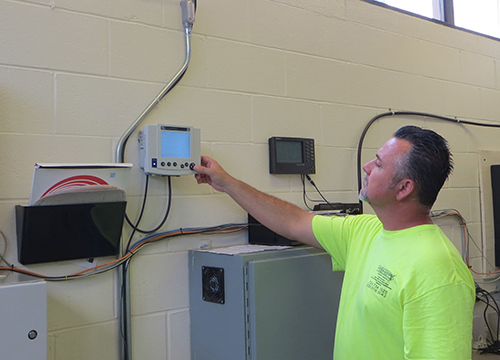
Cappitte checks the settings on the IQ SensorNet 2020 Controller
In the second stage, the facility uses a second VARiON probe with identical sensors to the first stage, plus a SensoLyt® 700 pH probe. Real-time pH data allow the team to accurately adjust caustic soda inputs to ensure the proper alkalinity needed for nitrification.
The 2020 universal controller lets the team monitor process conditions from the comfort of the control building, without having to go out to the basins to take readings. Watson says, “These sensors are unbelievable for the simple fact that you have data every 10 minutes. It’s almost like an alarm system.” And since the display is portable, Watson can also take it along when he needs to perform a matrix adjustment, which is typically necessary about every 3 months.
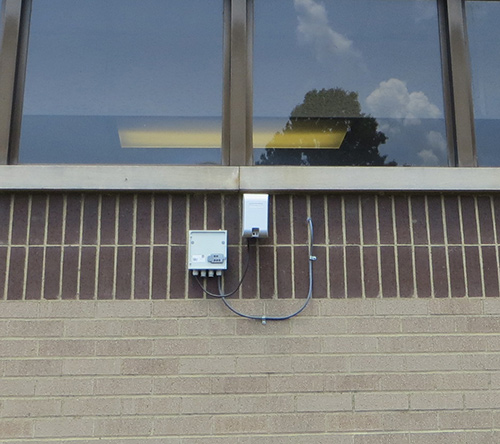
IQ SensorNet Wireless Module
Should Meander WRRF decide to add sensors or reconfigure the IQ SensorNet in the future, the system’s modular plug-and-play design can connect up to 20 sensors. This simplified scalability saves time and money, lowering the cost of system expansion.
Improved Compliance, Lower Costs
Overall, YSI’s IQ SensorNet helps Meander WRRF staff maintain tighter control over the treatment process. With real-time data on ammonium, nitrate, and pH, Watson knows right away if problems arise during the nitrification process. It also helps the team better detect shock loads and mitigate the impacts of large rainfall events.
The IQ SensorNet lets Watson and DeNiro troubleshoot problems in real-time, helping them ensure sufficient rates of nitrification and ammonia removal. He says the system lets them address issues faster, more effectively, and more efficiently than ever before. This proactive approach means there’s no need to panic when problems occur.
This makes it easier for the Meander WRRF to meet permit requirements, a major achievement for a facility that once struggled to keep up with rapidly changing process conditions.
“We had zero compliance issues this past winter,” says Watson. “The YSI meters were a huge part of that success,” he adds.
In the past, the plant had to buy nitrifiers every winter to make up for deficiencies in the nitrification process. However, that wasn’t necessary once the team had the IQ SensorNet system. This saved the facility several thousand dollars this year, savings that go directly back into the operating budget.
The IQ SensorNet system also reduces the time and cost associated with maintenance. Watson says YSI’s rugged probes provide accurate, reliable data without the need for calibration for weeks or even months. Even though pure oxygen systems are notoriously high-fouling environments, the probes only need to be cleaned once weekly.
Watson says YSI’s customer support is another element that’s made a huge difference in achieving success with the new equipment.
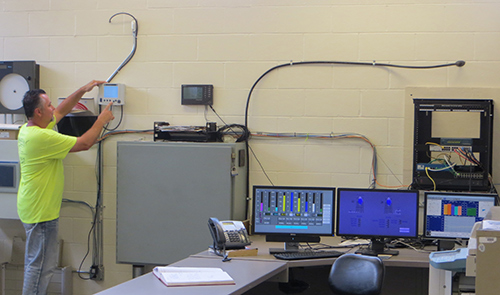
Mahoning County staff checks the settings on the IQ SensorNet 2020 XT Controller
“I can’t say enough about the tech support,” Watson says, adding, “If you call them, you get someone immediately, and they help you iron out any glitches right away.”
All told, the IQ SensorNet system makes it easy for the Meander WRRF to stay in compliance with permit requirements, providing the real-time data needed to keep up with problems and ensure the best effluent possible. To Watson, this all adds up to greater peace of mind.
“It really helps you sleep better at night,” he says.
Special thanks to Ben Watson and Joe DeNiro for their help in writing this Application Note.

Additional Blog Posts of Interest
Monitoring Orthophosphate for Reduced Chemical Costs in Water Resource Recovery Facilities
Reliable Ammonium and Nitrate Measurements from Online ISE Sensors
Wastewater Monitoring: Lightning vs. the IQ SensorNet System
Wastewater Aeration Control - Energy Cost Savings Examples